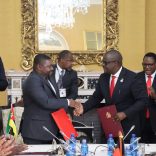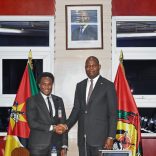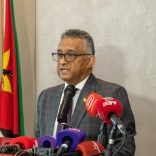Mozambique: Civil society criticises president for rejecting Mondlane accord
Mozambique: Violence in Cabo Delgado results from inequality, poverty – MDM

File photo: Lusa
The leader of the Mozambique Democratic Movement (MDM) argued that armed violence in Cabo Delgado results from social inequality and poverty of the population, considering that the government is unable to solve the problem.
“This war has a history of several unresolved problems over the years, associated with governance mistakes, which push the population towards social inequalities and acute levels of poverty, which has facilitated internal and external organisations to finance this terrorism, but its rapid spread is an indicator of the lack of capacity, effectiveness and internal efficiency,” said Daviz Simango.
The leader of the MDM, the third political force with six of the 250 seats in parliament, was speaking during a press conference called to comment on the Mozambican head of state Filipe Nyusi’s declaration to the nation on the 100 days of governance of his second term.
Daviz Simango said he expected to hear from the Mozambican head of state a statement on the 162,000 people affected by violence in Cabo Delgado, where at least 500 people have died from armed incursions since October 2017.
“We hoped to hear what is being done to take care of the displaced people, who are confined to the district capitals subject to hunger and disease,” said the MDM president.
The armed attacks in Cabo Delgado, a region where megaprojects of natural gas extraction are advancing, are classified by international organizations and the government as a terrorist threat, and have been claimed by self-proclaimed ‘jihadist’ groups, with the aim of imposing an Islamic law in the region.
The leader of MDM also criticized the executive for its governance in these 100 days, considering that the country needs a “market economy that provides the populations with what they want, in the best and cheapest way possible”.
“We expected clear policies, because Mozambique must face the challenge of population growth in a sustainable way, making a change from a homogeneous model to agricultural systems that make intensive use of knowledge and adapt to specific places,” he said.
On the other hand, Simango criticized the stage of the negotiation process between the Government and Renamo, noting that the peace agreement signed between the parties did not produce results.
“So far nothing is said and there are no developments, even though demonstrations have been announced for the beginning of the integration of five thousand men [from Renamo]. The truth is that after all these months nothing is known,” he stressed.
The Mozambican head of state and the Renamo leader signed a peace agreement in August last year, an understanding that provides for the disarmament of the guerrillas of the main opposition party.
Eight months later, no guerrillas have yet surrendered their weapons, with the exception of 10 Renamo officers appointed to the Mozambican police who completed their training in November.













Leave a Reply
Be the First to Comment!
You must be logged in to post a comment.
You must be logged in to post a comment.